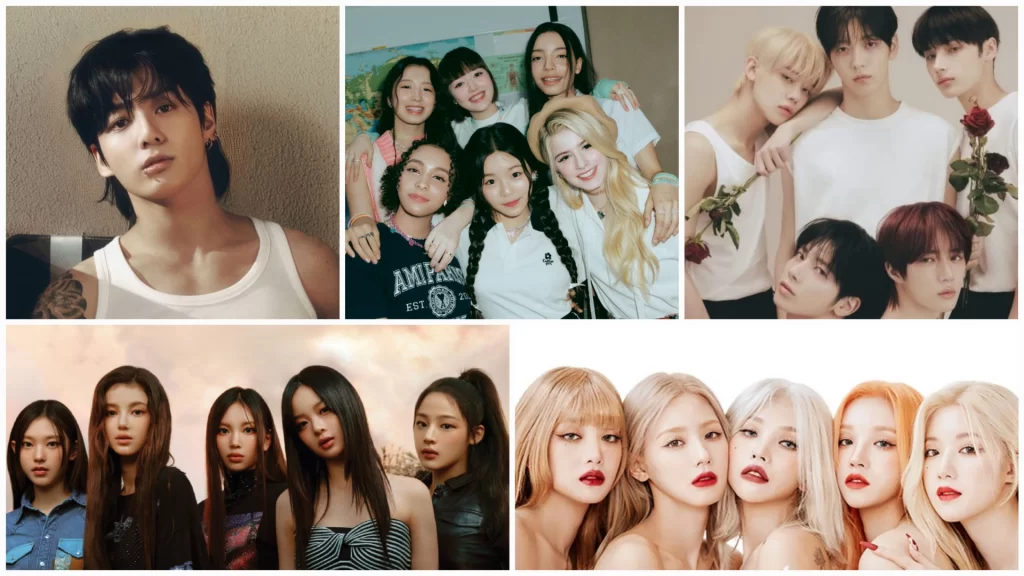As the year 2023 is about to reach its conclusion many K-pop channels, blogs, and podcasts are releasing their end-of-the-year reviews. I too wanted to look back and cover the biggest trends and acts in K-pop. However, the controversial NYT podcast ‘Jungkook, BTS & English Language K-pop‘ released earlier this week has driven me to discuss the identity and true meaning of K-pop.
The 47-minute podcast questioned whether K-pop is still K-pop if sung in English and why artists should even do that as the Western market is saturated with ‘English singers.’ It particularly discussed BTS Jungkook and his album Golden questioning his creative intent when there are other singers (non-Asian) who are doing that. Which limits his creativity by breaking it down into a language and his identity. Regardlessly, let’s discuss K-pop and its English releases.
Is K-pop still Korean pop music?
I know it sounds like a silly question, of course, K-pop is still Korean pop music but because of the higher inclusion of the English language and several all-English releases, people are questioning if the genre has lost its identity.
I want to add on to this one:
I thought artists were K-pop when they recorded in Mandarin and Japanese. I personally think non-Korean artists who work in Korea and make K-idol pop style are K-pop, so I really don't see why it can't be K-pop and in English. But if it's not, if it https://t.co/UzPTUCQX1P— CedarBough Saeji (@TheKpopProf) December 4, 2023
Firstly, this thought that incorporating of English language or singing a whole song/album in a different language threatens the identity of K-pop- actually narrows the grand genre to its country and language of origin. This is ridiculous as K-pop has continued to remain uniquely itself when Idols created Japanese EPs and debuted stars from Japan, China, Thailand, and more Asian countries.
The question has only arisen when the artists are winning hearts and trophies on the Western stage. This gives the impression that the problem threatening the identity of K-pop is not globalization but rather the thought that Asian artists should remain within the limits of their Asian-ness.
This is problematic in a thousand ways including that it overlooks the Korean and Asian diaspora who have been born and raised in other countries and used languages other than Korean for their whole life. It also limits Asian artists from attempting to create anything that isn’t stereotypical. However, for the sake of it let’s define what K-pop truly means.
What is the essence of K-pop?
After the breakthrough of Seo Taiji and Boys (popularly celebrated as the father of K-pop) in the 90s, K-pop has remained Idol music. The term K-pop wasn’t even used until its widespread reach in other Asian countries, the West, and eventually the global stage.
My husband listened to a clip from that NYT podcast, and said this: "First why is she comparing him to JT? Second, where was she when JT was ripping off and copying Usher. Why isn't she saying why do we need a JT when we have an Usher?" My dude dropped the mic on this one 🤯
— 𝓛𝓤𝓛𝓤 ⁷ ⟭⟬ BTS ⟬⟭ connected to 7G since ²⁰¹³ (@lsgrlr) December 4, 2023
However, things began to change with the 3rd and 4th generation. Many performers who aren’t/half/non-resident Korean began to debut in the groups. The artists also created music in various languages to break into the local music scenes of their neighboring countries. Similarly, the use of English began to rise as the industry started to spread into the Western market and I bet it will continue to experiment in languages ahead.
Therefore, K-pop has never been defined by its language or artists’ country. In my belief, it is only defined by experimentation and adaption of new trends and technologies. Seo Taiji and Boys experimented with global hip-hop music by adapting it for the citizens of the nation. The successive groups kept up with this trend by trying new genres including reggae, soul, R&B, rock, bubblegum pop, and more.
Happy 3rd Anniversary to #aespa's hugely talented #Karina, #Giselle, #Winter and #Ningning, famous for popularizing the metaverse concept and hyperpop music in K-pop! They are one of the best-selling Korean girl groups of the Era, whose 3rd EP, #MyWorld, sold 2.1 million units,… pic.twitter.com/1bLCXRtKFZ
— World Music Awards (@WORLDMUSICAWARD) November 16, 2023
Even now when K-pop is incorporating the latest technologies like Metaverse and AI, debuting global and AI stars, and singing in various languages, one of which is English, it’s continuing what it has always done. Surely, the group having some relation with South Korea is important to continue that innate Korean-ness of the industry but that is never a reason to pigeonhole the artists.
To conclude, K-pop as an industry is greatly defined by experimentation and creativity. Its artist including BTS Jungkook, new-gen groups like NewJeans, (G)I-DLE, and American K-pop groups such as VCHA are all free to experiment and grow their art without breaking or harming the identity of K-pop.
